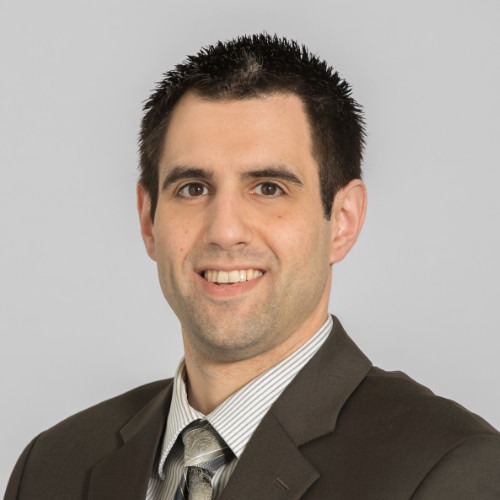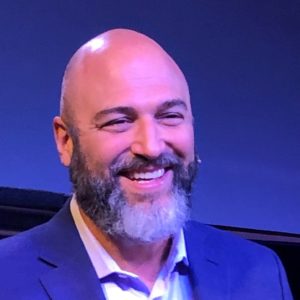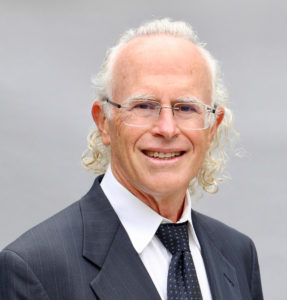Introducing: Mark Parkinson…
| Left to right: Mark Parkinson’s official headshot with the American Health Care Association and the National Center for Assisted Living (AHCA/NCAL); Parkinson on New Year’s Eve 1999 with his facility residents. |
Mark Parkinson can’t part with his eldercare memories. These moments are as important to his professional identity as anything else that’s happened throughout his life.
Take the time many years ago when he came upon a female resident in one of his facilities, sitting in the dining room, bleeding from her forehead. This particular senior had thin skin that would tear easily. And on this day, no one knew how the tear had developed, just that it needed to be closed. So Parkinson watched as his then nine-year-old son, Alex, approached the resident without orders to do so and placed a washcloth to her face, delicately staunching the wound, displaying calmness and maturity and instinct. “It was a moment when I thought, ‘Wow, I am so glad we are doing this,’” says Parkinson in proud remembrance.
Who exactly “we” is has come to define Parkinson’s first few months on the job as president of the American Health Care Association and the National Center for Assisted Living. He says “we” in referring to his associations‘ membership of skilled nursing and senior living providers. “We” is also the collective designation for his fellow owners and operators in this business, in which he has more than 15 years‘ experience. Most importantly, and in this instance, “we” is his family, who has been there for seemingly all of those decisive memories in long-term care.
| From top to bottom: Mark Parkinson, sworn in as governor of Kansas on April 28, 2009, surrounded by his family; son Sam presents flowers to residents at an intimate event; Stacy Parkinson Hula-Hooping during a facility activity. |
When the announcement was made last September that 53-year-old Kansas Gov. Mark Parkinson would replace outgoing AHCA/NCAL President Bruce Yarwood in 2011, the governor released a statement in which he expressly mentioned his family’s significance to this new career as association lobbyist. “My wife Stacy and I share a passion for this cause,” the statement read. To some observers, this may have appeared to solely reference his senior living ventures in 10 facilities—as CEO of Ad Astra Development and founder of various Allen Park, Inc., properties. “A lot of people think that maybe we were just passing investors in nursing homes, and that’s really not it at all,” Parkinson now says. “Stacy and I quit practicing law in 1995 and we worked out of our facilities for 10 years. We did everything.”
The Parkinsons met on the second day of law school and have been inseparable for 30 years. (“There were only three years where we did not work side by side,” Parkinson says.) Uprooting themselves from law to long-term care made sense, as they wanted to devote themselves to the elderly. Building assisted living facilities and nursing homes “was incredibly important and rewarding work,” he says. “Now what the AHCA position allows us to do is fulfill our mission of improving the lives of older people and have an impact that is probably a thousandfold what we could achieve by building one facility at a time.” Association members, take note: The “we” in this quote is going to involve you. Parkinson has some pretty big plans for the future. And it all revolves around quality.
* * *
Here’s another long-term care story you might not have heard: Mark Parkinson once took his daughter Kit to a facility when she was but a little one. And on this day, his wife was elsewhere, probably attending to some serious business. As is the case with dependent two-year-olds, Kit eventually needed a diaper change—except that her father had, well,
misplaced the replacements.
“One of the residents helped him with that,” Stacy Parkinson says, unaffectedly, “by using Depends and some duct tape.” Mark remains silent, as if recalling some brief sentence served in the doghouse. “That was pretty funny—she continues, without a hint of amusement—and it’s something I didn’t learn about until about five years after it happened.” Both husband and wife then break out into laughter.
It was quite common for the Parkinsons to spend prolonged time at their facilities, the reasons for which extended beyond administrative upkeep. For example, Stacy Parkinson admits to not being much of a cook, so many of the family’s holidays were shared with residents taking part in the meals prepared by staff. “Our children were blessed with many grandparents a hundred times over,” Stacy says. Their other son, Sam, grew up singing to and with the residents during activities. He’s now studying at the Boston Conservatory with hopes of becoming an opera singer. One wonders if some elderly encouragement helped him form that dream.
The value in being exposed to senior citizens, however, was not an exclusive perk for their children. Mark Parkinson says that within a year of being a facility owner, he had two revelations that became integral to his career path. “The first is the population—the people living in nursing homes and assisted living facilities are much frailer and older than I would have thought,” he says. “You see the ads with the active seniors coming off the golf course and heading into the facility, and to be honest, that’s just not realistic. So I thought going into this that we would be sitting around, having a lot of lively conversations with residents. And although those would happen from time to time, the usual course was that these were people who had enormous physical and mental and emotional needs.
| From top to bottom: Parkinson’s oldest son Alex with residents for a holiday event; daughter Kit shares an elder’s embrace. |
“The second revelation that I had,” he continues, “is that when people get older, they don’t change. There’s this perception out there that as you age, all of a sudden you get boring and uninteresting, and that’s just not the case. Whatever it is somebody likes to do or think or talk about when they were younger or middle aged is what they want to think and talk about and do when they are older. There isn’t an age where it becomes OK to lose your privacy, where all of a sudden it becomes OK to be in a room with a whole bunch of other people in all sorts of odd situations, where it becomes OK to not care about your dignity.
“What we are doing with our facilities”—our meaning AHCA/NCAL members—is we’re trying to recognize that and provide settings where as people age, they can still do all the things they liked to do.”
This, of course, goes back to the delivery of quality long-term care and Parkinson’s vision for the future, which we have incidentally mentioned but have to explain. But before getting to that, there’s one more story to be told.
* * * The first building the Parkinsons had constructed was an assisted living facility, the kind that could not accommodate the exceptional needs of residents with Alzheimer’s disease. For a short period, the Parkinsons tried to care for some of these people, which generated all types of challenges for both the operators and the residents needing specialized care. And one of those residents was a woman with significant dementia, a phenomenal person who everyone had fallen in love with, especially Mark and Stacy.
And there it is about Mark Parkinson—a father and husband, a typical AHCA/NCAL member, a businessman who reframed the context of his company because of an issue of quality. This was not to correct a deficiency in quality, mind you, but he did it because of a desire for greater quality in the care delivered under his name to the people he had grown to love like family. He sees himself, like so many of his association members see themselves, as an individual within the greater whole of long-term care, desiring the respect and understanding of a budget-constrained system of government, someone who proclaims that “we are the low-cost, high-quality provider for both long-term and post-acute care.”
“The overwhelming majority of our membership is made up of people like Stacy and me, people who got into this profession because of a passion to improve the lives of older people,” he says. “There’s a commitment to quality because it’s the right thing to do, and secondly there’s a commitment to quality because there’s a recognition that the free market system works, and if you’re not providing quality care you’re going to get punished. You’ve seen facilities work very hard to improve various quality measurements, whether it’s the percent of residents who are in pain or restraints or who have pressure ulcers. And I think it’s very exciting that we have a profession that, unlike many others, is taking responsibility for its own quality levels.
“We want to be the quality leaders,” he emphasizes. “We don’t want to be dragged along by CMS or some regulators—we want to do this ourselves.”
AHCA recently moved forward in this direction when its board of governors approved a strategic plan to create a new quality division. Everyone at the association who had previously been working in some capacity on quality programs will continue their work under this single division with a new boss in Rhode Island’s former director at the Department of Health, David R. Gifford, MD, chair of the National Quality Forum’s Public/Community Health Agency Council and member of the National Commission on Prevention Priorities. “What we hope is that [Gifford] will continue to move our quality programs forward, get more of our membership involved in quality programs, and just take this all to the next level.”
Except that Mark Parkinson is already leading them there, because he knows what it’s like to do the work and to strive for better in this field. He’s as much an AHCA member as he is its president. Quality, it seems, will remain. LTL
All photographs courtesy of the American Health Care Association and the National Center for Assisted Living (AHCA/NCAL). Long-Term Living 2011 April;60(4):34-38

Kevin Kolus wrote for I Advance Senior Care / Long-Term Living when he was an editor. He left the brand in 2012. He is now senior communications manager at Cleveland Clinic.
Related Articles
Topics: Advocacy , Articles , Leadership











